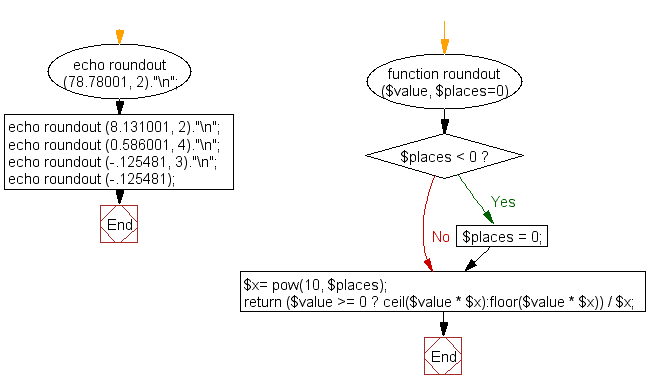PHP Math Exercises: Round a float away from zero to a specified number of decimal places
PHP math: Exercise-8 with Solution
Write a PHP function to round a float away from zero to a specified number of decimal places.
Sample Data :
(78.78001, 2)
(8.131001, 2)
(0.586001, 4)
(-.125481, 3)
-.125481
Sample Solution:
PHP Code:
<?php
function roundout ($value, $places=0) {
if ($places < 0) { $places = 0; }
$x= pow(10, $places);
return ($value >= 0 ? ceil($value * $x):floor($value * $x)) / $x;
}
echo roundout (78.78001, 2)."\n";
echo roundout (8.131001, 2)."\n";
echo roundout (0.586001, 4)."\n";
echo roundout (-.125481, 3)."\n";
echo roundout (-.125481);
?>
Sample Output:
78.79 8.14 0.5861 -0.126 -1
Flowchart :

PHP Code Editor:
Have another way to solve this solution? Contribute your code (and comments) through Disqus.
Previous: Find earliest and latest dates from a list of dates.
Next: Write a PHP function to convert Arabic numbers to Roman numerals.
What is the difficulty level of this exercise?
Test your Programming skills with w3resource's quiz.
PHP: Tips of the Day
How to Sort Multi-dimensional Array by Value?
Try a usort, If you are still on PHP 5.2 or earlier, you'll have to define a sorting function first:
Example:
function sortByOrder($a, $b) {
return $a['order'] - $b['order'];
}
usort($myArray, 'sortByOrder');
Starting in PHP 5.3, you can use an anonymous function:
usort($myArray, function($a, $b) {
return $a['order'] - $b['order'];
});
And finally with PHP 7 you can use the spaceship operator:
usort($myArray, function($a, $b) {
return $a['order'] <=> $b['order'];
});
To extend this to multi-dimensional sorting, reference the second/third sorting elements if the first is zero - best explained below. You can also use this for sorting on sub-elements.
usort($myArray, function($a, $b) {
$retval = $a['order'] <=> $b['order'];
if ($retval == 0) {
$retval = $a['suborder'] <=> $b['suborder'];
if ($retval == 0) {
$retval = $a['details']['subsuborder'] <=> $b['details']['subsuborder'];
}
}
return $retval;
});
If you need to retain key associations, use uasort() - see comparison of array sorting functions in the manual
Ref : https://bit.ly/3i77vCC
- New Content published on w3resource:
- HTML-CSS Practical: Exercises, Practice, Solution
- Java Regular Expression: Exercises, Practice, Solution
- Scala Programming Exercises, Practice, Solution
- Python Itertools exercises
- Python Numpy exercises
- Python GeoPy Package exercises
- Python Pandas exercises
- Python nltk exercises
- Python BeautifulSoup exercises
- Form Template
- Composer - PHP Package Manager
- PHPUnit - PHP Testing
- Laravel - PHP Framework
- Angular - JavaScript Framework
- Vue - JavaScript Framework
- Jest - JavaScript Testing Framework
